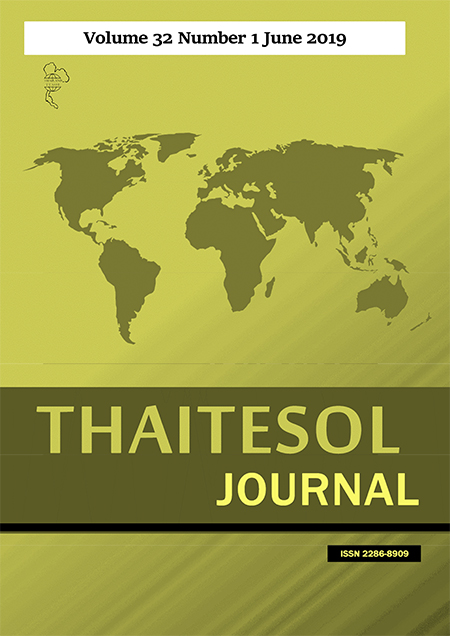How is English Assessed at Thai Schools?
Main Article Content
Abstract
In the test-centric Thai education system, results on national exams are often viewed as indicators of educational success. These exams use multiple-choice which can have detrimental effects on students’ attitudes and learning. If school assessments also rely on multiple-choice exams, the situation would be worrying, yet there is little data available on how English language courses at Thai schools are evaluated. This paper presents the initial results of a large-scale survey of the assessment practices of several hundred Thai teachers. On average, exams and quizzes account for 64% of marks for a course, and 60% of exam scores come from multiple-choice (meaning that multiple-choice accounts for 27% of marks). Furthermore, a high proportion of teachers use some innovative and creative assessment practices, providing chances for further positive developments. To promote more positive impacts from assessment, a greater proportion of the overall scores should be assigned to innovative formative assessment.
Article Details
Materials in THAITESOL JOURNAL may be photocopied for educational purposes. Under no circumstances may any part of this journal be photocopied for commercial purposes.
References
Basic Education Commission (2008). Basic Education Core Curriculum BE 2551 (AD 2008). Bangkok: Ministry of Education.
Brown, J. D. (1997). Testing washback in language education. PASAA, 27, 64-79.
Brown, J. D. (2005) Testing in language programs. Singapore: McGraw-Hill.
Brown, G., Bull, J. & Pendlebury, M. (1997). Assessing student learning in higher education. London: Routledge.
Burke, K. (1999). How to assess authentic learning. Arlington Heights, IL: Skylight Professional Development.
Cheng, L. (2014). Consequences, impact, and washback. In A. J. Kunnan (Ed.). The companion to language assessment (chapter 68). New York: John Wiley.
Chulalongkorn University (2000). Report on the project to evaluate the development of education at the primary and secondary levels in government and private sectors—
science, mathematics and English. Bangkok: Chulalongkorn University Academic Service Centre.
Fitzpatrick, D. (2011). Making sense of the English language policy in Thailand: An exploration of teachers’ practices and dispositions (Unpublished PhD thesis). University
of Exeter.
Forsyth, I., Jolliffe, A. & Stevens, D. (1999). Planning a course, 2nd edition. London: Kogan.
Goodman, J. E. (2012). Testing Thais: Establishing the ordinary in Thai national exams (Unpublished MA thesis). Cornell University.
OECD/UNESCO (2016). Reviews of national policies for education: Education in Thailand. Paris: OECD Publishing.
Office of the National Education Commission (1999). National Education Act of B.E.2542 (1999). Bangkok: Office of the National Education Commission.
Nonthaisong, K. (2015). The impact of the English language policy in the Basic Education Core Curriculum B.E. 2551(A.D. 2008) on English instruction of Thai secondary EFL teachers: A multiple case study in northeast Thailand (Unpublished PhD thesis). University of Alabama.
Piboonkanarax, K. (2007). A survey of secondary school evaluation procedures focusing on continuous assessment (Unpublished MA thesis). King Mongkut’s University of
Technology Thonburi, Bangkok.
Scully, D. (2017). Constructing multiple-choice items to measure higher-order thinking. Practical Assessment, Research & Evaluation, 22(4), 1-13.
Thongsri, M., Charumanee, N. & Chatupote, M. (2006). The implementation of 2001 English language curriculum in government secondary schools in Songkhla. ThaiTESOL Bulletin, 19(1), 60-94.
Watson Todd, R. (2008). The impact of evaluation on Thai ELT. Selected Proceedings of the 12th English in South – East Asia International Conference: Trends and Directions (pp.118 – 127). Bangkok: King Mongkut’s University of Technology Thonburi.
Watson Todd, R. & Shih, C. (2014). Assessing English in Southeast Asia. In A. J. Kunnan (Ed.) The companion to language assessment (chapter 102). New York: John Wiley.


